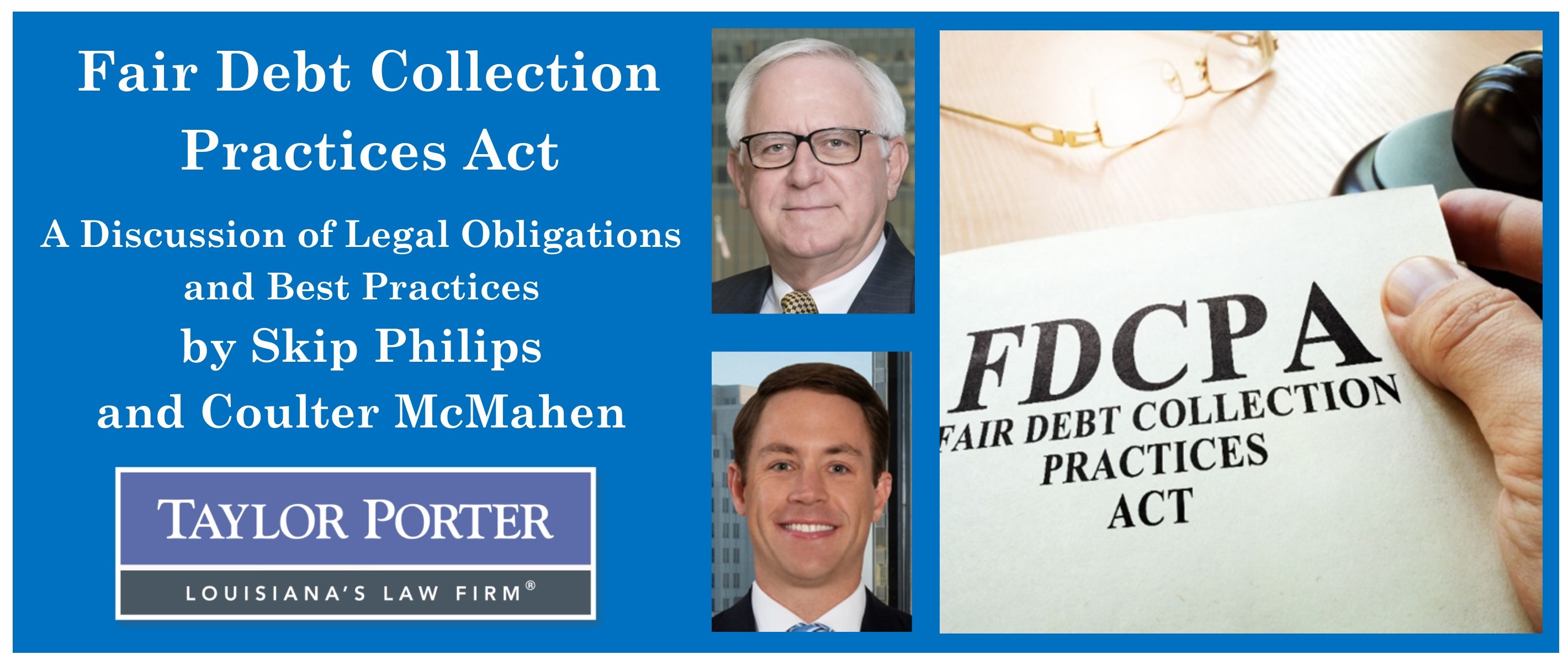Fair Debt Collection Practices Act: Obligations and Best Practices
June 28, 2019
Click here to view presentation
 Taylor Porter attorneys Skip Philips and Coulter McMahen recently presented to a client on the Fair Debt Collection Practices Act (“FDCPA”), discussing the obligations of both creditors and debt collectors pursuant to the FDCPA and Louisiana’s related statute, applications to businesses, and recommended best practices.
Taylor Porter attorneys Skip Philips and Coulter McMahen recently presented to a client on the Fair Debt Collection Practices Act (“FDCPA”), discussing the obligations of both creditors and debt collectors pursuant to the FDCPA and Louisiana’s related statute, applications to businesses, and recommended best practices.
The Fair Debt Collections Practices Act (“FDCPA”), 15 U.S.C. §§ 1692-1692p, was enacted on September 20, 1977. The purpose of the FDCPA was to eliminate certain abusive, deceptive, and unfair debt collection practices. The debts covered under the FDCPA are credit card debt, auto loans, medical bills, student loans, mortgage, and other household debts. However, business debts are not covered.
A “creditor” is any person who offers or extends credit creating a debt or to whom a debt is owed. A “debt collector” is any person who uses letters, phone calls, emails, text messages, social media in any business the principal purpose of which is the collection of any debts, or who regularly collects or attempts to collect, directly or indirectly, debts owed or due or asserted to be owed or due another. The FDCPA also extends coverage to “any creditor who, in the process of collecting his own debts, uses any name other than his own which would indicate that a third person is collecting or attempting to collect such debts."
Application to Businesses
Creditors who collect in their own name and whose principal business is not debt collection are not subject to the FDCPA. However, if a business hires an attorney or collection company to collect the debt, then that attorney or company would be subject to the requirements of the FDCPA.
Debt collectors can call you, or send letters, emails, or text messages to collect a debt. However, a debt collector must send you a written “validation notice” within five days of first contacting you. The notice must say:
- how much money you owe;
- the name of the creditor you owe it to; and
- what to do if you do not think it is your debt.
If a debtor disputes that he owes the debt, he can send the debt collector a letter stating he does not owe any or all of the money, or asking for a verification of the debt. If debtor sends the letter within 30 days of getting the validation notice, the debt collector has to send you written verification of the debt, like a copy of a bill for the amount you owe, before it can start trying to collect the debt again. Debt collectors cannot contact you at inconvenient times or places. For example, they cannot contact you before 8:00 a.m. or after 9:00 p.m., unless you agree to it. Debt collectors also cannot contact you at work if they are told you are not allowed to get calls there. Debtors can prevent a debt collector from contacting him, at any time, by sending a letter by mail requesting the debt collector cease all contact.•A debt collector generally cannot discuss your debt with anyone but you or your spouse.
Debt Collector Obligations in General
If an attorney is representing you, the debt collector has to contact the attorney. Debt collectors cannot harass you, threaten you, or engage in unfair practices. Debtors can sue a debt collector in state or federal court within one year of the date the FDCPA was violated. In order to succeed on a claim, the debt collector must show:
- He has been the object of collection activity arising from a consumer debt;
- Defendant is a debt collector defined by the FDCPA; and
- Defendant engaged in an act or omission prohibited by the FDCPA.
Creditor Obligations in Louisiana
Louisiana has not enacted a separate State law that is substantially different from the FDCPA. However, the Louisiana Fair Debt Collection Statute, La. R.S. 9:3562, is more detailed as to creditors. La. R.S. 9:3562 provides that a creditor “shall not contact any person other than an extender of credit or credit reporting agency who is not living, residing, or present in the household of the debtor regarding the debtor’s obligation to pay a debt." The statute prohibits creditors from communicating with third-parties about a debtor’s obligation. Therefore, if there is no evidence that the creditor communicated with a third-party, then debtor’s claim fails.
If the debtor has defaulted on his promise to pay, and if he has given specific notice in writing by registered or certified mail, instructing the creditor to cease further contacts regarding the debt, the creditor must limit mail contacts to one notice per month so long as the notice is not designed to threaten action not otherwise permitted by law. If the debtor has instructed the creditor to cease further contact, the creditor may make a maximum of four personal contacts with the debtor for the purpose of settling the obligation provided such contacts are not designed to threaten action not otherwise permitted by law. There are no Louisiana decisions on what constitutes a personal contact. Therefore, out of an abundance of caution, the personal contacts should be limited to mail.
Collecting on a Debt
Submit documentation to your attorney substantiating the genuineness of the claim in order to calculate the precise amount due. Ensure creditor does not accept payment from or conduct discussions with debtor, because discussions might create an acceptance of less than the amount due in accord and satisfaction. The third step is to locate the debtor and, where applicable, to make a proper demand satisfying the requirements for an award of attorney's fees to the creditor if suit is required.
Recommended Best Practices
Creditors, collecting on their own debt, should be aware of the Louisiana Fair Debt Collection Statute and strictly comply with the statute. If a parent company is collecting on behalf of one of its subsidiaries, it should detail its relationship with the subsidiary and state that it is the creditor, if that is in fact the case. This avoids the allegation that a creditor is using a name other than its own that would indicate a third person is collecting or attempting to collect such debts.
Out of an abundance of caution, businesses should ensure that its third party vendor has written policies and procedures that require employees to act in accordance with the requirements of the FDCPA. A creditor collecting on its own behalf does not have a duty to respond to a debtor’s demand letter that mistakenly identifies the creditor as a debt collector. However, it would be prudent to draft a form letter to the debtor acknowledging receipt of the letter.



